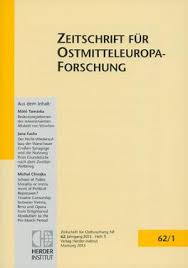„Eine durch und durch demokratische Nation“. Demokratie und Minderheitenschutz in der Außendarstellung Litauens nach 1918
“A Thoroughly Democratic Nation”. Democracy and Minority Protection in Lithuania’s Image Abroad
Author(s): Klaus RichterSubject(s): Diplomatic history, Government/Political systems, International relations/trade, Nationalism Studies, Pre-WW I & WW I (1900 -1919), Interwar Period (1920 - 1939)
Published by: Verlag Herder-Institut
Keywords: “A Thoroughly Democratic Nation”; Democracy; Minority Protection; Lithuania’s Image Abroad;
Summary/Abstract: The article argues that leading figures of the emerging Lithuanian state in 1918 to 1920 used democratic semantics and mechanisms to gain international support for their project of consolidating statehood. These were used specifically to dissociate independent Lithuania from Bolshevik Russia, from Germany, and from Poland. With the devaluation of alternative political models, such as the Brest system and Bolshevism, democracy became the only legitimate basis for the newly emerging states of East Central Europe. The article thus looks at the history of early interwar Lithuania from an international perspective, using Lithuanian newspapers and correspondence between Lithuanian political actors and representatives and journalists of the Western Entente. In Lithuanian nationalism prior to the First World War, democracy played a very minor role. Moreover, only a small number of Lithuanians had experience with democratic practices. The short-lived Brest-Litovsk system, to which the newly independent Lithuanian state belonged, was intrinsically anti-democratic. Democracy as a legitimate foundation of statehood became important only with the German defeat in November 1918. The new Lithuanian state subsequently took up concepts of “western” democracy, particularly from the U.S., making them part of a lobbying effort, which was carried out partly by Lithuanian state actors themselves (e.g. at the Paris Peace Conference) or by diaspora Lithuanians. Democracy as discussed within Lithuania was an integrating system, encapsulating secular liberalism and political Catholicism, which had been the most important (and often conflicting) political movements within Lithuanian pre-World War I nationalism. Lithuania was thus conceived of as a “thoroughly democratic nation”, which was by nature opposed to German authoritarianism and Russian Bolshevism. Even as the members of the Western Entente continued to pin their hopes on the White Movement as the main opponent of Bolshevism, Lithuania was increasingly perceived abroad as a successful antiBolshevik de facto state. In the first half of 1919, minority rights became a part of the Versailles agenda. With anti-Jewish pogroms perpetrated by Polish soldiers, Lithuanian state actors successfully invented the Lithuanian Republic as a multi-ethnic counterweight to an increasingly chauvinistic Poland and as a protector of Belarusians and Jews. While the integration of Belarusians went almost unnoticed abroad, the granting of cultural and administrative autonomy to the Lithuanian Jews became a powerful propaganda tool for Lithuanian state actors and diaspora Lithuanians lobbying in the USA. The international perception that Polish territorial ambitions in the East were becoming increasingly problematic and threatening peace was a decisive factor for international support of Lithuanian independence. The final granting of de jure statehood, however, only came in 1922 with the international awareness that the White movement had failed – it thus became more practical to support democratic states at the former imperial periphery than permit them to fall to Bolshevism. Belarusian and Jewish autonomy were abolished only a short time later. The limitation of Lithuanian democracy to the purpose of consolidating statehood in the specific post-First World War context very possibly contributed to its quick decline: The coup of 1926 and the establishment of Smetona as “national leader” two years later effectively abolished the short-lived Lithuanian democracy.
Journal: Zeitschrift für Ostmitteleuropa-Forschung
- Issue Year: 64/2015
- Issue No: 2
- Page Range: 194-217
- Page Count: 24
- Language: German

